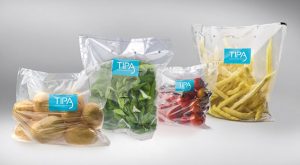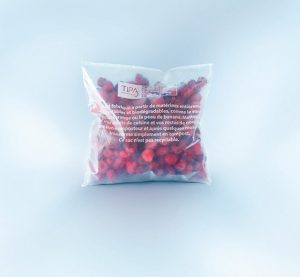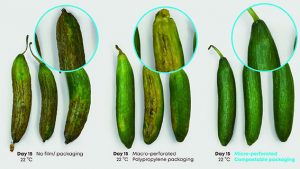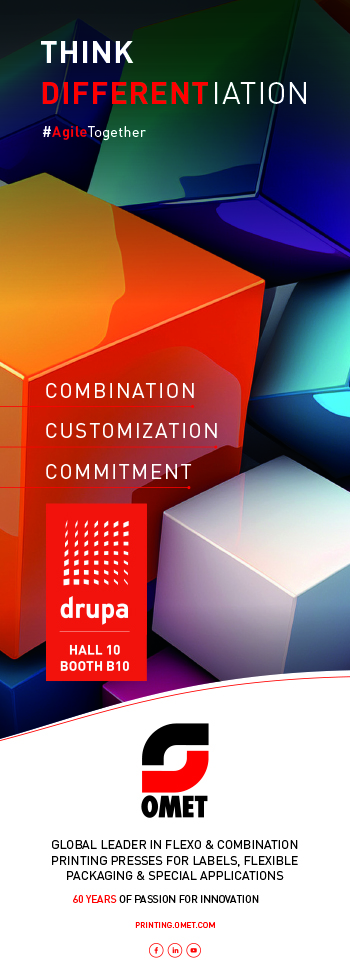 Peer reviewed research finds micro-perforated compostable packaging may outperform conventional plastic for shelf-life. Properly designed compostable packaging found to extend shelf-life of cucumbers by 5 days compared to commercially used plastic packages. Additional advantage of the compostable packaging was prevention of water condensation that encourages rotting of vegetables wrapped in conventional plastics. The results cast new doubt on the claim that conventional plastic packaging provides the only possible solution for preserving freshness on the market. The compostable packages used in the studies were purchased from TIPA® Corp, a leading producer of compostable materials.
Peer reviewed research finds micro-perforated compostable packaging may outperform conventional plastic for shelf-life. Properly designed compostable packaging found to extend shelf-life of cucumbers by 5 days compared to commercially used plastic packages. Additional advantage of the compostable packaging was prevention of water condensation that encourages rotting of vegetables wrapped in conventional plastics. The results cast new doubt on the claim that conventional plastic packaging provides the only possible solution for preserving freshness on the market. The compostable packages used in the studies were purchased from TIPA® Corp, a leading producer of compostable materials.
COMPOSTABLE packaging is as effective as conventional plastic and may even outperform it for shelf-life of fresh produce, has been found in two peer reviewed studies, it was recently revealed. The results cast new doubt on the claim that conventional plastic packaging is the only possible solution for preserving freshness on the market and provide an environmentally friendly alternative to the use of conventional plastics.
Scientists at the Agricultural Research Organization (ARO), The Volcani Institute (Israel), found compostable packaging enables shelf-life of bell peppers up to 21 days and cucumbers up to 15 days, even better than conventional plastic.
 Researchers used cucumbers and bell peppers to test the differences between compostable packaging and conventional plastic packaging. Both types of packaging allowed keeping bell peppers for four weeks, and cucumbers for two weeks in refrigerated home storage. In addition, properly designed micro-perforated compostable packages extended the non-refrigerated shelf life of cucumbers up to 15 days, compared to not more than 10 days in conventional plastic packs. Additional advantage of the compostable packaging was prevention of water condensation that encourages rotting of vegetables wrapped in conventional plastics. The compostable packages used in the studies were purchased from TIPA® Corp.
Researchers used cucumbers and bell peppers to test the differences between compostable packaging and conventional plastic packaging. Both types of packaging allowed keeping bell peppers for four weeks, and cucumbers for two weeks in refrigerated home storage. In addition, properly designed micro-perforated compostable packages extended the non-refrigerated shelf life of cucumbers up to 15 days, compared to not more than 10 days in conventional plastic packs. Additional advantage of the compostable packaging was prevention of water condensation that encourages rotting of vegetables wrapped in conventional plastics. The compostable packages used in the studies were purchased from TIPA® Corp.
The study on cucumbers has been published in a special issue of the journal Foods on “Recent Advances in Reusable, Recyclable, or Compostable Food Packages”, and the study on bell peppers has been published in the journal Food Science & Nutrition.
 To evaluate the various packages, part of the produce remained unpacked as control, while other produce were packaged in non-perforated, micro-perforated and macro-perforated compostable packaging or in commercial macro-perforated polypropylene packaging. Afterwards, half of the samples were continually stored at 22o C to simulate extended shelf conditions, while the other half were stored for two days at 15oc, a further two days at 22oc and then up to six weeks of home refrigerator storage at 4oc to simulate farm to fork supply chain conditions.
To evaluate the various packages, part of the produce remained unpacked as control, while other produce were packaged in non-perforated, micro-perforated and macro-perforated compostable packaging or in commercial macro-perforated polypropylene packaging. Afterwards, half of the samples were continually stored at 22o C to simulate extended shelf conditions, while the other half were stored for two days at 15oc, a further two days at 22oc and then up to six weeks of home refrigerator storage at 4oc to simulate farm to fork supply chain conditions.
All produce was evaluated weekly, to test for fruit weight loss, shriveling, softening, decay, peel damage and flavor. Both papers concluded that TIPA’s micro-perforated compostable packaging provided a preferable alternative to traditional plastics for vegetable preservation.
For decades plastic has been viewed as necessary to extend the shelf-life of foods. But these studies show environment-polluting conventional plastic is no longer the only available option.
Demand for these solutions is also growing among consumers. A recent poll found that more than eight-in-ten Britons would rather prefer their food was wrapped in compostable packaging than in traditional plastic.
Experts argue that the results show it is time to stop considering conventional plastic as the standout material it was when first created, as innovative waste-free solutions can now outperform it.
Eli Lancry Ph.D, VP Technology of TIPA, said “Here at TIPA, we have been confident for a long time that compostable packaging is not only functional, but is the future of how we package our food. Plastic has dominated our lives for decades, but that does not mean things cannot change. Compostable packaging is a ready-made solution to end the scourge of plastic waste where packaging is needed.”
Dr Ron Porat, Head of the Institute of Postharvest and Food Sciences, ARO, The Volcani Institute and co-author of the research papers (together with Dr. Victor Rodov and Ph.D. student Abiola Owoyemi), said: “These results are very exciting. They show that compostable packaging is very effective in preserving postharvest quality and reducing losses of various fruits and vegetables. For a long time, plastic appeared to be the only solution for storing food for longer and became a great detriment to the environment as a result. This may provide an efficient, environmentally friendly alternative to conventional plastic packaging.”






















